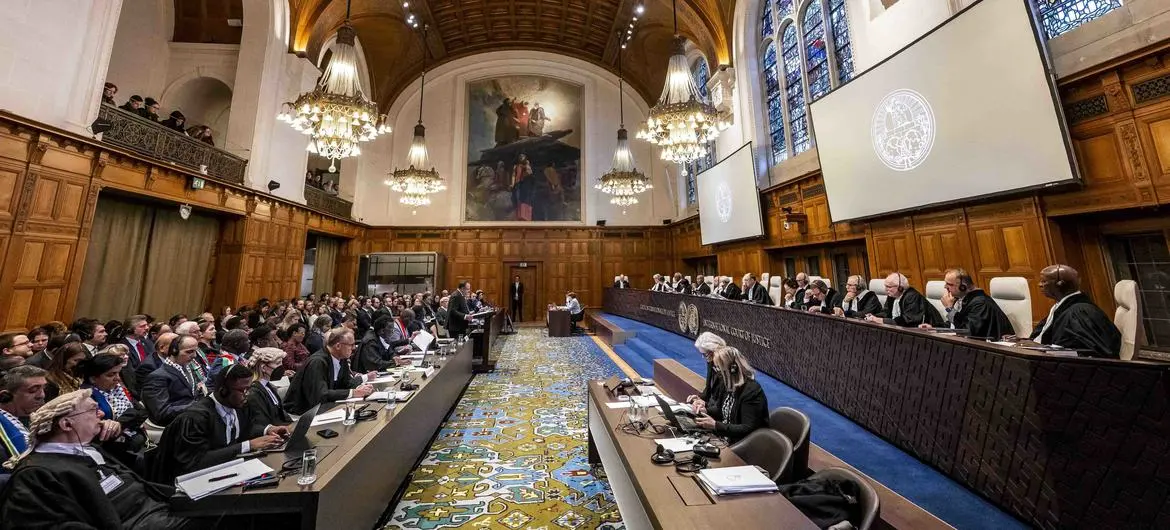On the 26 of January 2024 (after 112 days of carnage), the International Court of Justice issued a decision/injunction with six provisional measures (available here) and will continue deliberation. The six provisional measures requested are an important win for human rights and could be a game changer even as Israel tried to dismiss them and will go on with carnage.
Quotes from the court ruling:
In light of the foregoing, the Court concludes that, prima facie, it has jurisdiction pursuant to Article IX of the Genocide Convention to entertain the case. Given the above conclusion, the Court considers that it cannot accede to Israel’s request that the case be removed from the General List…..The Palestinians appear to constitute a distinct “national, ethnical, racial or religious group”, and hence a protected group within the meaning of Article II of the Genocide Convention. The Court observes that, according to United Nations sources, the Palestinian population of the Gaza Strip comprises over 2 million people. Palestinians in the Gaza Strip form a substantial part of the protected group….;.The Court, pursuant to Article 41 of its Statute, has the power to indicate provisional measures….The Court considers that, with regard to the situation described above, Israel must, in accordance with its obligations under the Genocide Convention, in relation to Palestinians in Gaza, take all measures within its power to prevent the commission of all acts within the scope of Article II of this Convention, in particular: (a) killing members of the group; (b) causing serious bodily or mental harm to members of the group; (c) deliberately inflicting on the group conditions of life calculated to bring about its physical destruction in whole or in part; and (d) imposing measures intended to prevent births within the group. The Court recalls that these acts fall within the scope of Article II of the Convention when they are committed with the intent to destroy in whole or in part a group as such (see paragraph 44 above). The Court further considers that Israel must ensure with immediate effect that its military forces do not commit any of the above-described acts.
The final six decisions of the ICJ (provisional measures):
(1) By fifteen votes to two, The State of Israel shall, in accordance with its obligations under the Convention on the Prevention and Punishment of the Crime of Genocide, in relation to Palestinians in Gaza, take all measures within its power to prevent the commission of all acts within the scope of Article II of this Convention, in particular: (a) killing members of the group; (b) causing serious bodily or mental harm to members of the group; (c) deliberately inflicting on the group conditions of life calculated to bring about its physical destruction in whole or in part; and (d) imposing measures intended to prevent births within the group;
(2) By fifteen votes to two, The State of Israel shall ensure with immediate effect that its military does not commit any acts described in point 1 above;
(3) By sixteen votes to one, The State of Israel shall take all measures within its power to prevent and punish the direct and public incitement to commit genocide in relation to members of the Palestinian group in the Gaza Strip;
(4) By sixteen votes to one, The State of Israel shall take immediate and effective measures to enable the provision of urgently needed basic services and humanitarian assistance to address the adverse conditions of life faced by Palestinians in the Gaza Strip;
(5) By fifteen votes to two, The State of Israel shall take effective measures to prevent the destruction and ensure the preservation of evidence related to allegations of acts within the scope of Article II and Article III of the Convention on the Prevention and Punishment of the Crime of Genocide against members of the Palestinian group in the Gaza Strip
(6) By fifteen votes to two, The State of Israel shall submit a report to the Court on all measures taken to give effect to this Order within one month as from the date of this Order.
The most reputable court on earth has effectively ruled and with a huge majority that: 1) there is plausible evidence of genocidal acts requiring immediate intervention justifying taking the case, 2) that Palestinians are at grave risk of genocide (warranting 6 injunctions noted above)…The resolution implicitly but not explicitly stipulates a ceasefire. But the decision orders refraining from killing Palestinian civilians and refraining from causing any physical or psychological harm under article 2 of the convention. The decision demands the immediate provision of basic services and humanitarian aid (food, water, medicine, fuel) denied by the Israeli army since 7 October.
The resolution was issued close to consensus, with a vote of 15 to 2, which means that there is international consensus on the existence of Israel’s intention to annihilate. The American judge, the French judge, and the German judge voted in favor of the resolution, contrary to the declared
position of their countries. This is an indication that may constitute a message from those countries of their unwillingness to risk undermining the international system they established to sustain their influence.
The Israeli judge appointed ad hoc for this case, Aharon Barak, contradicted his government’s legal position, which rejects the court’s jurisdiction in this case in the first place, and that it risks undermining the legitimacy of Israel when it exposes it to precautionary measures based on the Genocide Convention. Judge Barak voted in favor of the decision on the items preventing incitement and providing basic services and aid, meaning that he granted legitimacy to the court’s jurisdiction in accordance with the Genocide Convention in principle. The judge who voted against all the provisions of the resolution was the Ugandan judge, Julia Sabotendi, including the two provisions that were supported by the Israeli judge, reminds us of the Ugandan option for the Jewish state (1903) and its current government being occupied.

